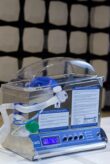The many challenges posed by the Covid 19 pandemic have not only led to short-term changes. They could equally bring about long-term innovations. This is shown, for example, by a look at the Western Balkan countries. In March 2021, PTB hosted a virtual exchange of experiences on innovations in quality infrastructure institutions and services, QI for short, in the countries of the Western Balkans. More than 30 participants from metrology institutes, standards bodies and accreditation bodies were present. Innovation activities were presented and discussed with the aim of promoting them in the long term.
The virtual exchange of experiences showed that almost all QI institutions in the Western Balkans had the same challenges. The sudden onset of the pandemic caught them unprepared, so that many standard processes could not be carried out as usual. By and by it also became clear that the pandemic would last longer than initially expected. The initial wait-and-see had to turn into action. The innovations that resulted made it possible for the QI institutions to remain able to act during the pandemic. During the virtual exchange, the focus was not on entirely new services, but rather on developing new ways to carry out already existing work processes.
Hands-on laboratory training and campaigns to increase visibility.
One example is the switch from on-site to remote laboratory training. Employees of the Institute of Metrology of Bosnia and Herzegovina participated in a remote hands-on laboratory training. The content was delivered via video streaming from the laboratory and via LabView. LabView is an application that enables the automation of measurements. The positive reactions of the participants show: Remote hands-on laboratory training is not just an emergency solution, but can also be used after the pandemic. Due to the accurate preparation, many found the remote training more interactive and efficient. In addition, the high degree of personal responsibility in implementing the individual steps was perceived as positive.
The Montenegrin Bureau of Metrology y (MBM) showed how campaigns and competitions can significantly increase awareness. For example, the support of the Stay at home campaign resulted in a competition on cooking measurements for young children and a scientific campaign for students. The activities received a lot of media attention and increased the visibility of the MBM. Further activities are planned for the future, such as the development of digital calibration certificates or the establishment of an e-learning platform.
Remote Peer Evaluation
Evaluations are a crucial milestone for accreditation bodies in terms of international recognition of their services. The challenge that arose during the Covid 19 pandemic is remote peer evaluation. In February 2021, Albania’s General Directorate of Accreditation, or DPA, was evaluated. This was conducted in the context of a European Accreditation (EA) peer evaluation. The biggest challenge in the remote peer evaluation process was the availability of a stable and fast internet connection. Another public institution supported the DPA in this and also provided a video conferencing platform. The DPA provided tablets and smartphones for the on-site visit, contracted an external company to operate the cameras and ensured smooth communication by providing interpreters. The implementation of this innovation was very successful, which was mainly due to two factors. The preparations for the remote evaluation had already begun before the pandemic. In addition, the DPA already had an online system for client relations with which all accreditation steps could be carried out.
Innovation in standards institutes to help in the Covid 19 pandemic
The Standardization Institute of the Republic of North Macedonia, or ISRSM, temporarily made available 18 standards for protective and medical devices and anaesthesia and respiratory equipment. 30 other ISO standards were made available for free download on the ISO website. While some revenue was lost through the free provision, the Institute was able to increase its visibility in the business community, for example by advertising the free standards on the website of the Northern Macedonian Chamber of Commerce.
Another innovation was the adoption at very short notice of a document from the European Committee for Standardisation, or CEN. This is CEN Workshop Agreement 17553: Community face coverings – Guide to minimum requirements, methods of testing and use. As a result of the development of a pan-European procedure, it could be adopted within only three months.
Common challenges for innovation
What was triggered by the pandemic situation should continue to be applied. Innovative activities are to be strongly encouraged. In addition to the examples of remote services and visibility campaigns given here, other innovative developments mentioned were the shift to e-training provision and digitisation of services, online meetings of technical committees and general online communication with stakeholders.
The detailed report on the virtual exchange of experiences can be found at the following link:
https://www.covid19.ptb.de/economy/innovation
Image: Istock








